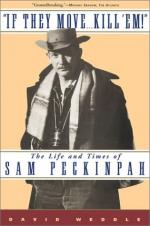|
This section contains 285 words (approx. 1 page at 300 words per page) |

|
Cross of Iron is a polemic against war, more specifically against war-as-necessity, and it tries to define the role of male virtue in such vicious circumstances. Honor is always defined by circumstance. The huge irony upon which the film turns, however, is that while men may excel in combat, their personal excellence never justifies the context. Here, as in Ride the High Country and The Ballad of Cable Hogue, Peckinpah is openly curious about the stern wisdom that underpins male vanity. (p. 7)
Cross of Iron is no closet drama. Peckinpah avoids the convenient black comedy and intellectual pieties of a [Lina] Wertmüller. The film is punctuated, often unexpectedly, with images of ruined anonymous bodies, humans made meat by the indifferent mechanics of war, a profanation of old values of human dignity. His critics notwithstanding, I don't think Peckinpah is interested in kineticism for its own sake. The...
|
This section contains 285 words (approx. 1 page at 300 words per page) |

|


